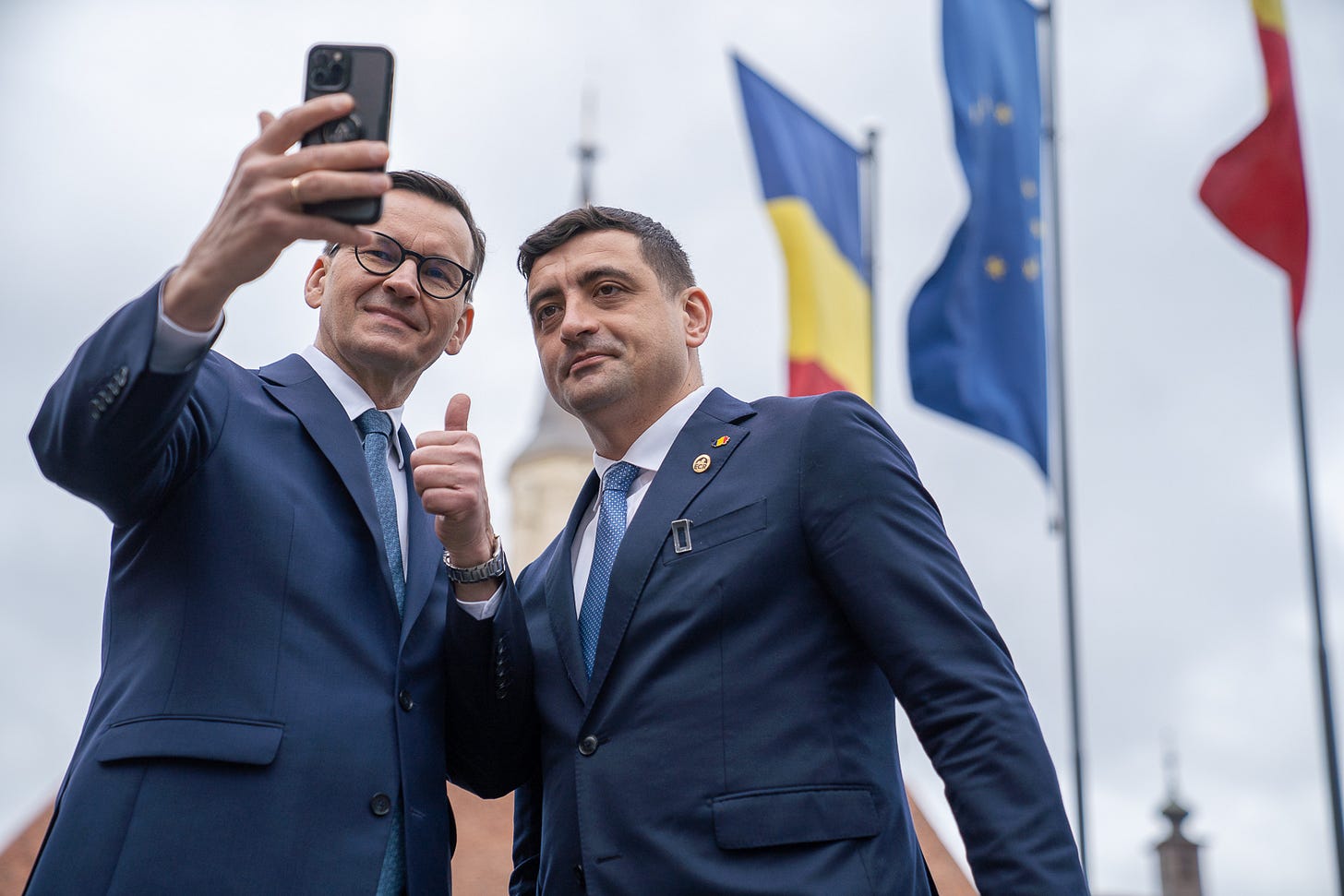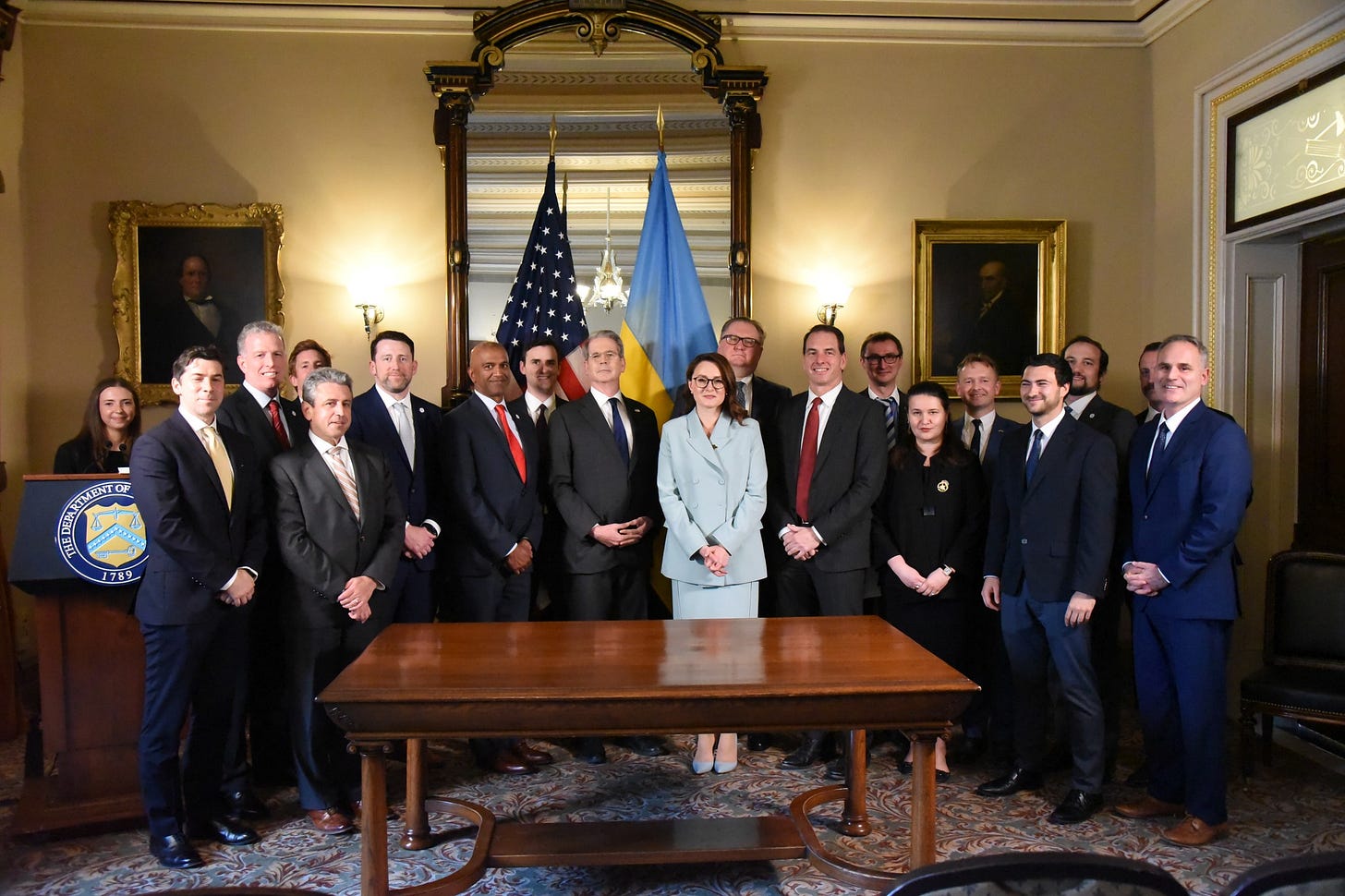Ukraine and Trump sign key minerals deal, the far-Right wins in Romania, and Poland and France prepare a new defense pact
April 29-May 5, 2025 in Eastern Europe

What You Need To Know:
This roundup combines last week’s top news with important underreported stories
1. Ukraine signed the long-awaited minerals deal with the US as Trump and his allies considered new ways to put pressure on Russia
US Treasury Secretary Scott Bessent announced on Wednesday that the US and Ukraine had signed the long-awaited minerals deal that had initially been abandoned following Trump and Zelensky’s Oval Office fight in late February. The version of the deal that was ultimately approved established a joint economic investment fund that will aid in Ukraine’s post-war reconstruction and gives the US preferential treatment in mineral extraction. Critically, Ukrainian minerals and investments in the reconstruction fund will not be seen as the country “paying back” America for past weapons aid, and future weapons shipments from the US will count towards America’s obligations under the investment fund. Although the deal does not include security guarantees as Ukraine had initially stipulated, it does importantly include language describing Russias as the aggressor in the war and a commitment to a “peaceful and sovereign” Ukraine. Russia reacted sharply to the deal, calling it, without a hint of irony, a step toward the “colonization of Ukraine.” Following the deal, reports emerged that an American Patriot air defense system from Israel will be transferred to Ukraine, and talks are underway for similar transfers to take place from Germany and Greece. Additionally, Republican Sen. Lindsey Graham has stated that he has broad support in Congress for a bill that would levy additional sanctions against Russia, including a 500% tariff on any country that buys Russian oil, gas, or other resources, while the US is reportedly in talks with Europeans on new sanctions on Russian banking and energy to force Moscow to agree to a 30-day ceasefire.
Why it matters: The minerals deal is a mixed bag for Ukraine — while it is a major diplomatic win for cooperation between Washington and Kyiv and does arguably give Trump material incentives for protecting Ukraine’s sovereignty, its lack of concrete security guarantees makes it less impactful on the war’s future than the White House would have the world believe. The transfer of Patriot systems to Ukraine are also encouraging, but it is telling that these transfers are coming from outside America’s domestic arsenal. Yet even though it is unlikely that additional sanctions will do much to convince Russia to agree to a ceasefire at this stage, the tariff threat could go a long way in further isolating Russia from allies who continue to buy its energy resources — including states in the EU like Hungary and Slovakia. Ultimately though, only time will tell if these latest moves represent a genuine pivot by Trump to Ukraine’s cause or whether Russia will find a way to convince him to pin the blame for the war on Zelensky yet again. After all, Trump is nothing if not capricious on the global stage, and his ongoing reluctance to materially support Ukraine’s defense indicates he may well continue to view Kyiv as a bargaining chip he can use for his own benefit.

2. Far-Right candidate George Simion won the first round of voting in Romania’s presidential election
George Simion, the head of the far-Right Alliance for the Union of Romanians (AUR) party, has come in first place in the first round of voting in Romania’s presidential election, garnering over 40% of the vote. In the second round of voting on May 18, Simion will take on pro-EU Bucharest mayor Nicușor Dan, who garnered around 21% of Sunday’s vote. Simion, who describes himself as a Trump ally, opposes military aid to Ukraine and has called for Romania to regain lost territories in Moldova and Ukraine, leading him to be banned on national security grounds from both countries. Simion’s rise came after the previous winner of the Romanian election that was annulled last year, Călin Georgescu, was barred from running in this weekend’s re-run, leading Simion to absorb much of his base. Simion’s popularity has come largely from non-urban populations and has been boosted by TikTok, which stated it has had to remove over 27,000 fake accounts linked to Simion and Georgescu in the lead-up to the election. After the vote, Romania’s pro-EU PM Marcel Ciolacu resigned along with his coalition, stating that he had lost the mandate of the Romanian people.
Why it matters: Following Georgescu’s annulled victory in last year’s vote, this second victory for the far-Right in Romania underscores just how deeply disillusionment with authorities in both Bucharest and Brussels has fueled the rise of Right-wing leaders and parties not just in Romania, but across Eastern Europe. If Simion carries the day in the second round, which is likely, Romania will likely join Hungary and Slovakia’s cadre of populist states in the EU opposed to Ukraine and focused on “national sovereignty,” making it even more difficult for the EU to carry out its internal and foreign policy. Although Simion has claimed he is more moderate than Georgescu and opposes Russia, his reluctance to arm Ukraine, his desire to annex the territory of his neighbors, and his claims that Russia is not really a threat to Romania or NATO do in fact serve Russian interests, and will greatly complicate efforts by NATO to strengthen its eastern flank and to continue supporting Kyiv militarily at a time of immense uncertainty about the future of European security.
3. Poland and France announced they will sign a new defense treaty, upgrading their relationship for the first time since 1991
In an implicit signal to Trump as he continues to cast doubt on America’s relationship with its European allies, Polish PM Donald Tusk and French President Emmanuel Macron announced they would be signing a new defense pact in France this week, which would serve as a long-awaited upgrade of their previous defense treaty established in 1991. The new treaty would significantly elevate Poland’s military relationship with France, and is a so-called “premium treaty” that so far had been reserved only for France’s immediate neighbors. Under the new agreement, France would be able to increase weapons sales to Poland, undertake shared security projects, invest in economic initiatives, and deepen talks on nuclear deterrence. Polish officials have recently stated that they are in talks with France about being included under Paris’s nuclear umbrella, and although it is reportedly unlikely the treaty will settle the issue directly, it is highly likely that conversations on the matter will take place when Tusk and Macron meet in Nancy, France to sign the new accord.
Why it matters: With its official elevation to the status of a key French defense ally, Poland will gain an important insurance policy against the vagaries of Trump’s shifting approach to European security, potentially setting the stage for a new era in its defense history. While France will be unable to wholly replace the US if Trump withdraws from Europe or undermines NATO, it will be a formidable ally in the web of new and deepened alliance Poland is likely to form moving forward. While the treaty itself may not formalize France’s nuclear relationship with Poland yet, it will likely be the first step toward the realization of this goal within the next year or two.
4. Russian FM Lavrov wrote a book introduction denying Lithuania’s right to exist as the country continued to clamp down on its security
According to new reports, a book published in March of this year features a foreword written by Russian Foreign Minister Sergei Lavrov which challenges the existence of the Lithuanian language and the basis for the modern Lithuanian state itself. The text, called simply “The History of Lithuania,” claims Lithuania has used “falsified historical narratives to incite anti-Russian and Russophobic sentiments” and that the current state was founded on a “pro-Nazi ideology” and only functions due to “the suppression of dissent.” The sentiments expressed in the text have been condemned by Lithuania’s Foreign Minister Kęstutis Budrys as propaganda. Meanwhile, Lithuania stated it would spend $1.2 billion to strengthen its fortifications along its borders with Russia and Belarus and would cancel the residence permits of Russian and Belarusian citizens who travel back home more than once every three months. These moves come as reports have emerged of Russian and Belarusian services trying to foment ethnic conflict in Lithuania on historical grounds in order to put pressure on the Belarusian opposition based in Vilnius.
Why it matters: When viewed in the context of the Kremlin’s existing pressure campaign against the Baltic states and Lithuania most recently, Lavrov’s text is highly concerning, especially because it closely mirrors Putin’s infamous essay, “On the Historical Unity of Russians and Ukrainians,” published not long before Russia’s invasion of Ukraine in 2022. While it is not likely that Russia will take such dramatic action against Lithuania in the immediate term especially while it is still engaged in Ukraine, it appears to already be building a case for potential Russian intervention down the line. Keeping an eye on Kremlin narratives on Lithuania in the near term will be key for understanding Putin’s future moves post-Ukraine.
5. Zelensky and Hungary’s Orbán engage in a war of words over Ukraine’s accession to the EU
Following months of Hungarian opposition to Ukraine fast-tracking its EU accession this year, Zelensky and Hungarian PM Viktor Orbán sparred over Ukraine’s future in the bloc late last week, with Zelensky citing figures from a poll by Hungary’s political opposition that showed a clear majority of Hungarians being in favor of Ukraine joining the EU. Orbán in turn responded by stating that “there is no Ukrainian EU accession without Hungary, later adding that the “Ukraine-friendly” government Zelensky wants to see in Hungary will not come to pass. According to Kyiv, Orbán may be attempting to use the issue of Ukrainian membership in the EU as political leverage ahead of Hungary’s 2026 elections, which will feature the strongest opponents to Orbán’s rule in over a decade.
Why it matters: While this spat between Ukraine and Hungary itself is usual fodder for Orbán, what it signifies is that the Hungarian leader appears willing to hold up the process of accession until he either gets further concessions from the EU in exchange for allowing Ukraine to join, or until after Hungary’s elections in April 2026. Unless Zelensky and the EU are able to engage in clever dealmaking with Orbán of the sort that convinced him to drop his veto of new sanction against Russia in March 2025, Ukraine may need to content itself with a much longer EU pathway than anticipated.
Other stories to watch:
— Ukraine not responsible for safety of foreign officials traveling to Moscow for May 9 parade, Zelensky says (The Kyiv Independent)
— Ukraine facing potential threat from planned military drills in Belarus – SBGS (Ukrinform)
— Georgia’s State Security Service again claims West plotted coup (OC Media)
— MPs in Sofia suspect sabotage of first Bulgarian F-16 (Euractiv)
— As Croatia’s fascist past sheds taboo, some local Jews fear for their future (Times of Israel)
— What’s the best way to deal with Russian information manipulation? Latvia has answers. (Atlantic Council)
— Poland struggles to re-arm for new era of war on its borders (Financial Times)
— Serbia’s President Vucic cuts short US visit and returns home after falling ill (Serbia)
— The Latest Battleground for Luxury Tourism: Albania’s Adriatic Coast (The New York Times)
— Zelenskyy announces plans to create unity hubs for Ukrainians in Czechia and other countries (Ukrainska Pravda)



